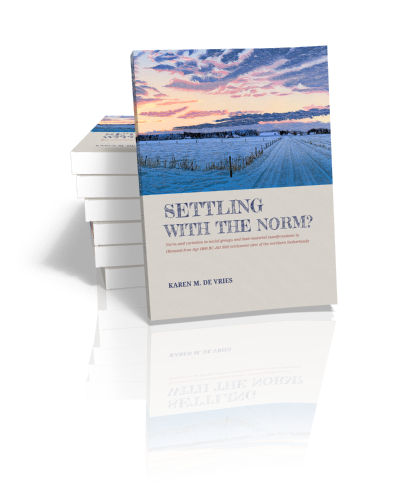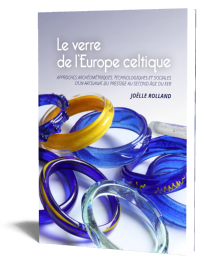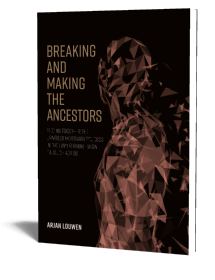Abstract:
When studying later prehistoric societies, it is evident that shared practices, as well as variations, exist in the settlement record. Traditionally, the emphasis has mainly been on the elements shared on large scales, the widely shared norms. Variations in material culture have received little attention. This is regrettable, because through the study of both norm and variation in material culture, it is possible to understand how people are part of larger communities and, at the same time, express their affiliation to smaller social groups. In this book, housebuilding practices, general deposition practices and special deposition practices from (Roman) Iron Age (800 BC-AD 300) settlements in the northern Netherlands are studied on different scales as practices that can be similar and different at the same time.
Based on the analyses, normativity and variation in material culture can be understood in different ways. For the whole period of research, housebuilding and (special) deposition practices are best understood as nested practices, in which spatial and social scales played different roles throughout the period of research. In addition to this, it has become evident that the degree of normativity, and thus of variation, visible in the archaeological record differed between subperiods, but could also vary between the practices within one subperiod. This means that, at the same time, large-scale affiliations could be stressed in one practice, while the importance of the smaller social group was emphasised in another practice.
More than just searching for a better understanding of the (Roman) Iron Age societies in the northern Netherlands, this thesis also aims to understand how the use of typochronologies and the choices researchers make influence our understanding of the past. This thesis is therefore not only of interest for researchers studying later prehistoric settlements but also for those interested in archaeological methodology in general.
Awards
Karen de Vries was awarded the W.A. van Es-prijs 2022 for her dissertation “Settling with the norm?”.
Contents
1. Introduction
2. Theoretical framework
3. Housebuilding traditions on the Fries-Drents plateau
4. Deposition practices on later prehistoric settlement sites
5. Special deposition practices
6. Conclusion
References
Appendix 1: Overview of (Roman) Iron Age sites on the Fries-Drents plateau
Appendix 2: Overview of house plans per period
Appendix 3: Overview of radiocarbon dates
Appendix 4: Co-occurrences between characteristics
Appendix 5: Description of pits discussed in chapter 5
Appendix 6: Overview of location of pits discussed in chapter 5
Appendix 7: Overview of characteristics of pits discussed in chapter 5
Dutch summary / Nederlandse samenvatting
Acknowledgements
Curriculum Vitae


Dr.
Karen M. de Vries
Karen de Vries studied Archaeology and Greek and Latin Languages and Cultures at the University of Groningen. In 2015, she obtained her research master’s degree ‘Art History and Archaeology’ cum laude at the University of Groningen. In the same year, she was awarded the W.A. van Es-prijs for her master thesis on Iron Age deposition practices on the Fries-Drents plateau. She was awarded a research grant from ARCHON/NWO for her PhD project titled Settling with the norm? Norm and variation in social groups and their material manifestations in (Roman) Iron Age (800 BC–AD 300) settlement sites of the northern Netherlands. From 2015 to 2021 she worked as a PhD candidate and as a lecturer at the Groningen Institute of Archaeology, University of Groningen. In 2021, she started as Archaeological Researcher at ADC ArcheoProjecten.
read more












